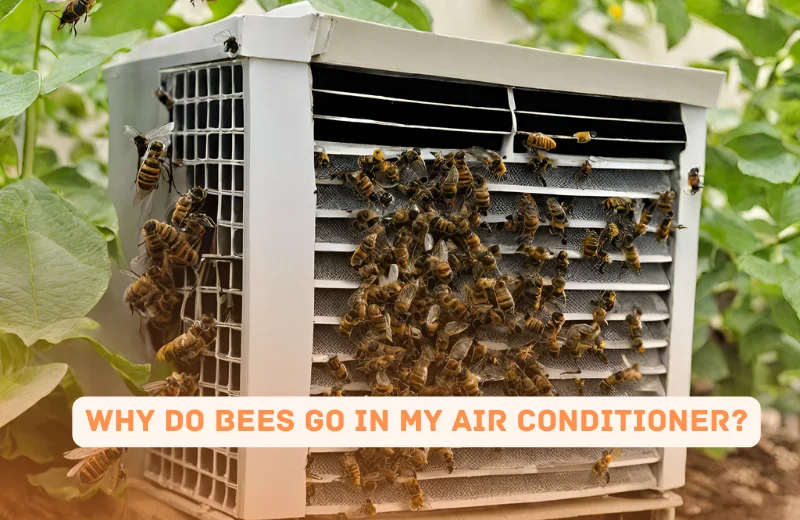Are you tired of having unwanted guests buzzing around your air conditioner? These winged creatures, be they bees or wasps, tend to annoy with their presence. But fear not, as we dive into the reasons behind their attraction to your cooling unit and explore effective ways to keep them at bay.

Why Are Bees Attracted to Your Air Conditioner?
Bees are drawn to air conditioners for several reasons. Firstly, the machine emits a subtle amount of heat, which bees can sense. Secondly, the vibration and hum produced by the air conditioner are attractive to these buzzing insects. Lastly, the machine’s noise and even the minimal light it emits can catch the attention of bees. So, your air conditioner becomes a multi-sensory attraction for these industrious pollinators.
Bees and Water Sources
Bees aren’t just seeking warmth; they are also on the lookout for water. Should an air conditioner be situated in close proximity to a body of water, its positioning may further incentivize bees to assemble around the environs. Ensuring a dry environment around your AC unit can help reduce the attractiveness to bees.
Keeping Bees at Bay
If the constant buzzing near your air conditioner is causing a buzzkill, fear not. Several practical steps exist that one might consider undertaking. Start by maintaining a clean environment around the unit. Bees are less likely to be attracted to a spot that lacks food sources or standing water. Regularly clean your air conditioner to eliminate any appealing odors or debris.
Can Wasps Enter Through Air Conditioners?
Wasps, those less-friendly cousins of bees, can also pose a threat. They are drawn to the cool air emitted by your AC unit and may even build nests in and around it. This can lead to aggressive behavior, and nobody wants a wasp sting. If you suspect wasps have made their way into your home via the air conditioner, calling a pest control professional is crucial. They can safely remove the nest and implement measures to prevent a return.
Can Wasps Enter Through Window AC?
Bees, always on the hunt for nectar, might venture into window air conditioners in search of food. While they don’t typically damage AC units, their presence can be a nuisance. Rather than attempting removal oneself, it is advisable to engage a professional apiary operator or pest management firm for extraction of any honeybee habitation discovered within air conditioning equipment, so as to guarantee their safe extraction by a skilled handler.
Bees Coming Through Air Vents
Surprisingly, finding a bee inside your home through air vents is not uncommon. Bees are attracted to the warmth of your home, and vents provide an easy entry point. To prevent this, make sure your air vents are properly screened. Seal any cracks and crevices around your home to keep these pollinators outdoors.
Bees in Your Bedroom:
Finding a buzzing cloud of honeymakers inhabiting your sleeping quarters could seem a frightful fancy, yet remain calm. Bees seek small, enclosed spaces to build nests, and your bedroom might fit the bill. Remain calm, as they are not interested in you unless provoked. By allowing them time to construct their dwelling, it is probable they shall continue their travels thereafter. Meanwhile, one could seize this chance to attentively watch over these intriguing animals in their natural habitat.
Bat Bugs and Bee-Free Living:
While not bees, bat bugs, relatives of bed bugs, can also pose a threat. These small, winged insects can bite, causing irritation. If you suspect a bat bug infestation, professional pest control is necessary, especially if bats are present.
Can bees freeze to death?
Bees can endure cold temperatures better than many insects. They shiver to generate heat but will eventually freeze to death if unable to find a warm resting place. Understanding their temperature limits (20-45 degrees Celsius) emphasizes the need to protect these vital pollinators.
What temperature kills bees?
Bees are crucial for our ecosystem, and their populations are declining. Extreme temperatures can be fatal for them. The ideal temperature for bees is around 35 degrees Celsius. Should temperatures exceed 45 degrees Celsius or drop beneath 20 degrees, the bees risk succumbing to the harsh conditions. Every bee counts, so if you encounter one in distress, lend a helping hand.
How do I get rid of bees in my air conditioner?
If bees have made your air conditioner their home, there are several solutions. While removing the hive yourself is an option, it can be risky without experience. Calling a professional beekeeper or pest control company is a safer bet. These experts have the knowledge and tools to ensure the bees are removed without harm and won’t return.
How do I keep bees out of my window air conditioner?
Nobody wants bees intruding on their cool haven. To keep them away, ensure there are no gaps around your window AC unit, as bees can squeeze through tiny spaces. Regularly clean the unit, seal any gaps with caulk, and trim back vegetation. By following these steps, you can create an environment less appealing to bees.
How do I keep wasps out of my air conditioner?
Wasps are attracted to air conditioners for various reasons, including water sources and potential food. To deter wasps, eliminate nearby food and water sources. If there’s a nest, professional removal is crucial. Wasp traps and repellents can also help keep these stingers at a safe distance.
How to Remove Bees From an Air Conditioner?
Conclusion
By comprehending the allure that draws bees and wasps to one’s air conditioner, taking the initial measures to deter their presence can commence. By maintaining a clean environment, sealing gaps, and taking preventive measures, you can enjoy a bee-free cooling experience. Bees are essential to our ecosystem, so let’s ensure they thrive outdoors while we enjoy the comfort of our homes.